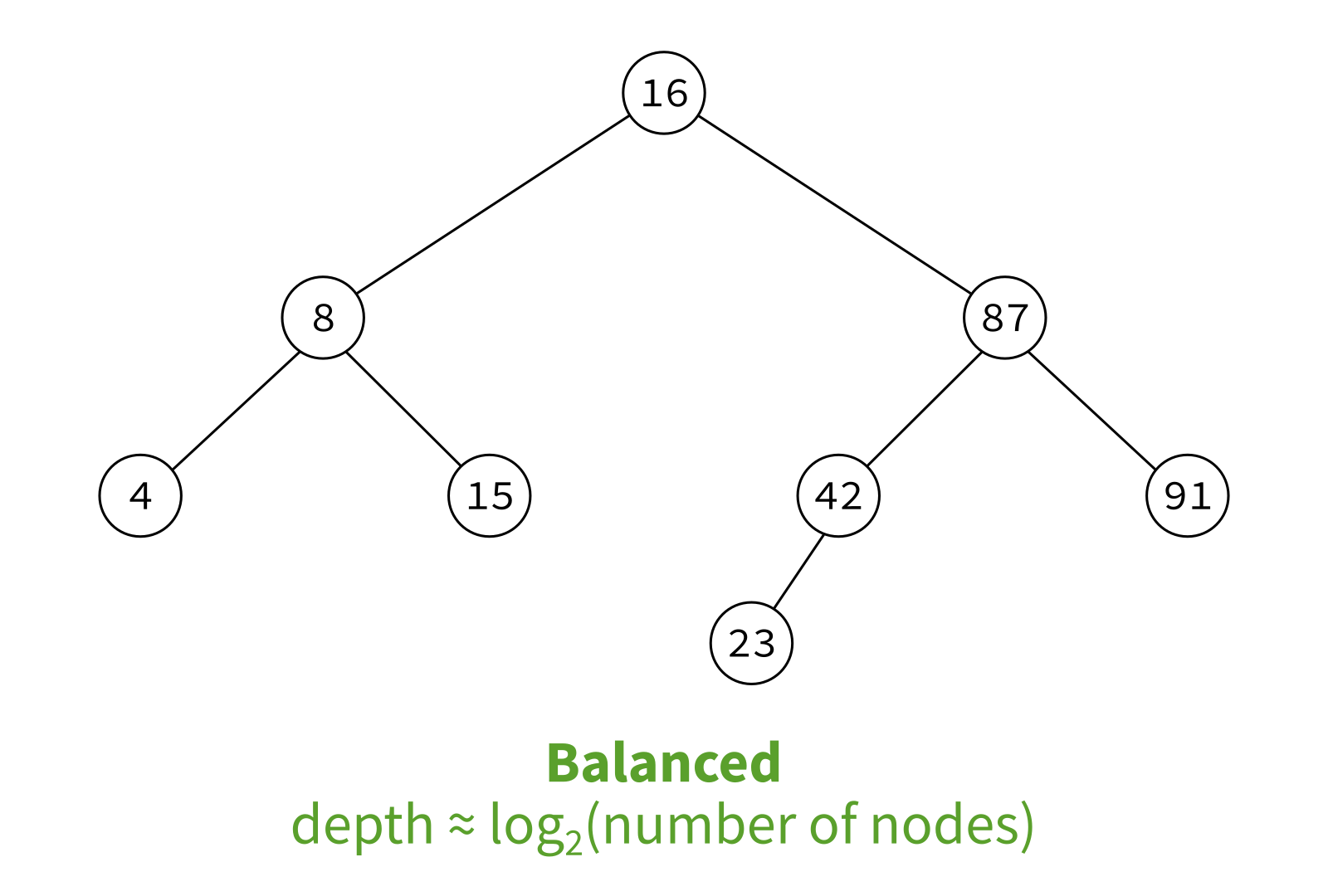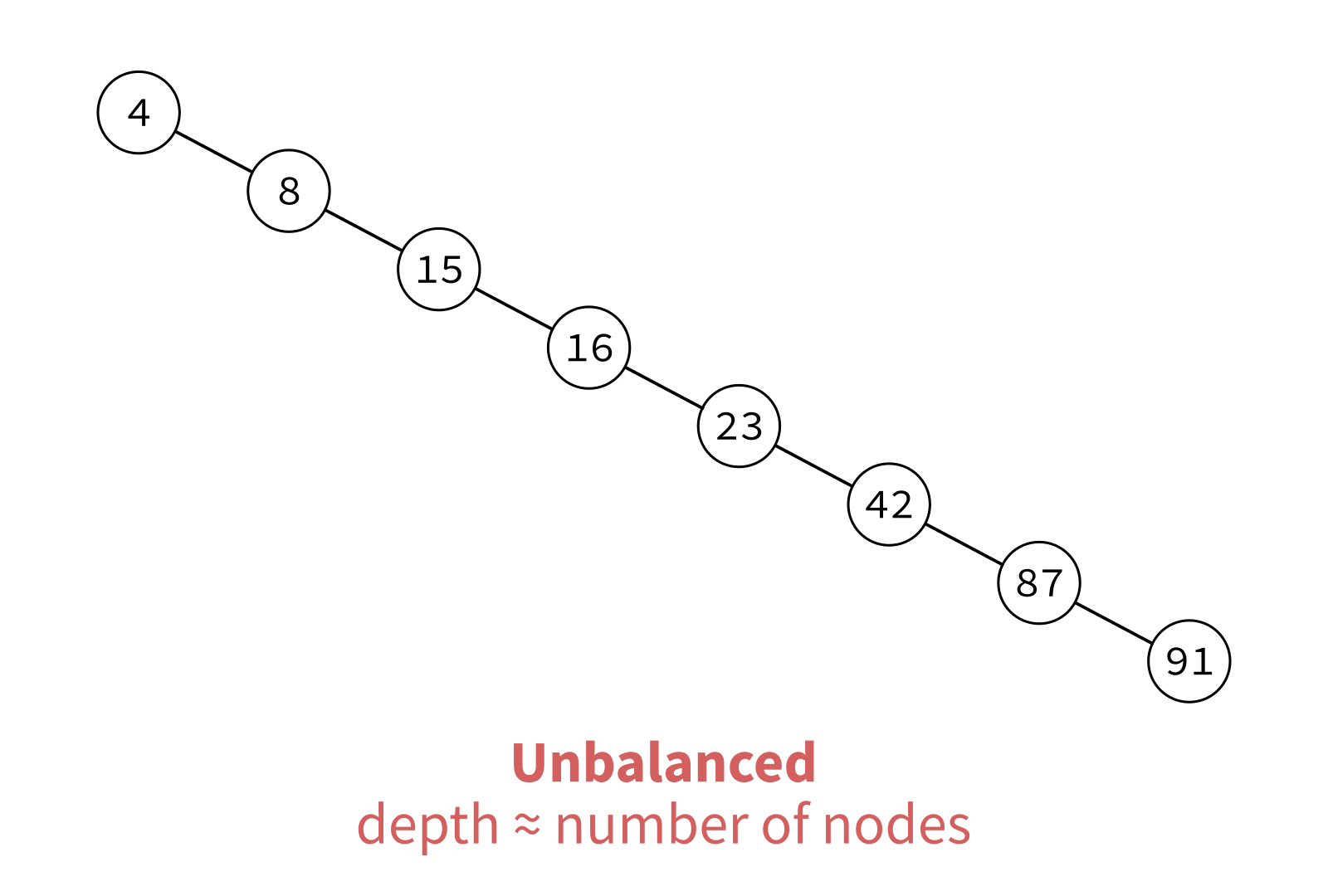Lecture 19
set and defaultdict
MCS 275 Spring 2023
Emily Dumas
Lecture 19: set and defaultdict
Reminders and announcements:
- Project 1 graded. Check the feedback!
- Project 2 grading underway.
- Project 3 (due March 17) coming soon.
- Homework 7 due tomorrow, now accepting submissions.
Plan
- Wrap up trees unit
- Start language features unit
IntegerSet variants
IntegerSet- uses BSTIntegerSetUL- uses unsorted listIntegerSetSL- uses sorted list
IntegerSet timing
integerset.py has been updated with a script to test addition and membership test times
for 20,000 integers.
Traversals
Last time we introduced the preorder, postorder, and inorder traversals of a binary tree.
The trees module now has methods for each of these.
Uniquely describing a tree
Many different binary trees can have the same inorder traversal.
Many different binary trees can have the same preorder traversal.
And yet:
Theorem: A binary tree T is uniquely determined by its inorder and
preorder traversals.
Last words on binary trees
- BSTs make a lot of data accessible in a few "hops" from the root.
- They are a good choice for mutable data structures involving search operations.
- Deletion of a node is an important feature we didn't implement. (Take MCS 360!)
- Unbalanced trees are less efficient.


MCS 360 usually covers rebalancing operations.
Set
Python's built-in type set represents an unordered collection of distinct objects.
You can put an object in a set if (and only if) it's allowed as a key of a
dict. For built-in types that usually just means immutable.
Allowed: bool, int, float, str, tuple
Not allowed: list, set
Set usage
S = { 4, 8, 15, 16, 23, 42 } # Set literal
S = set() # New empty set
S.add(5) # S is {5}
S.add(10) # S is {5,10}
8 in S # False
5 in S # True
S.discard(1) # Does nothing
S.remove(1) # Raises KeyError
S.remove(5) # Now S is {10}
S.pop() # Remove and return one element (unclear which!)
for x in S: # sets are iterable (but no control over order)
print(x)
Set operations
Binary operations returning new sets:
S | S2 # Evaluates to union of sets
S & S2 # Evaluates to intersection of sets
S.union(iterable) # Like | but allows any iterable
S.intersection(iterable) # Like & but allows any iterable
Set mutations
Operations that modify a set S based on contents of another collection.
# adds elements of iterable to S
S.update(iterable)
# remove anything from S that is NOT in the iterable
S.intersection_update(iterable)
# remove anything from S that is in the iterable
S.difference_update(iterable)
More about set
set has lots of other features that are described in the documentation.
Python's set is basically a dictionary without values.
For large collections, it is much faster than using a list.
Appropriate whenever order is not important, and items cannot appear multiple times.
Histogram
You want to know how many times each character appears in a string.
hist = dict()
for c in s:
hist[c] += 1This won't work. Why?
defaultdict
Built-in module collections contains a class defaultdict that works like a
dictionary, but
if a key is requested that doesn't exist, it creates it and assigns a default value.
import collections
hist = collections.defaultdict(int)
for c in s:
hist[c] += 1This works!
The defaultdict constructor takes one argument, a function default_factory.
default_factory is called to make default values for keys when needed.
Common examples with built-in factories:
defaultdict(list) # default value [] as returned by list()
defaultdict(int) # default value 0, as returned by int()
defaultdict(float) # default value 0.0, as returned by float()
defaultdict(str) # default value "", as returned by str()References
-
In optional course texts:
- Problem Solving with Algorithms and Data Structures using Python by Miller and Ranum, discusses binary trees in Chapter 7.
- Lutz discusses sets in Chapter 5, in the subsection "Other Numeric Types" (even though there is nothing "numeric" about sets).
-
Elsewhere:
- Cormen, Leiserson, Rivest, and Stein discusses graph theory and trees in Appendices B.4 and B.5, and binary search trees in Chapter 12.
Revision history
- 2022-03-02 Last year's lecture on this topic finalized
- 2022-02-26 Updated for 2023